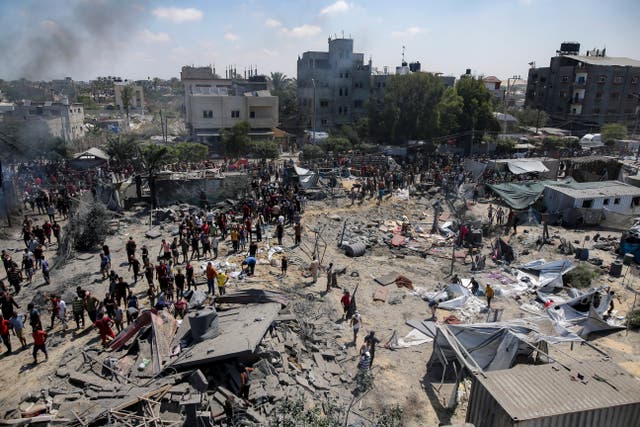Netanyahu makes surprise visit to southern Gaza, days before US Congress speech
Mr Netanyahu’s office announced his visit to Rafah once the prime minister had left the war-torn Palestinian territory

Israeli Prime Minister Benjamin Netanyahu made a surprise visit to troops in southern Gaza on Thursday, his office said, days before his speech to the US Congress.
Mr Netanyahu’s visit to Rafah was announced hours after Israel’s far-right national security minister, Itamar Ben-Gvir, visited Jerusalem’s most sensitive holy site, a move that could disrupt the delicate Gaza ceasefire talks.
Tensions over the compound have fuelled past rounds of violence.
Mr Ben-Gvir, an ultranationalist settler leader, said he had gone up to the contested Jerusalem hilltop compound of Al-Aqsa Mosque to pray for the return of the hostages “but without a reckless deal, without surrendering”.
The move threatens to disrupt sensitive talks aimed at reaching a ceasefire in the nine-month-old Israel-Hamas war.
Israeli negotiators landed in Cairo on Wednesday to keep working on the talks.
Mr Netanyahu’s office announced his visit to Rafah once the prime minister had left the war-torn Palestinian territory.
Rafah, once a crucial entry point for humanitarian aid, is now a dusty ghost town full of bullet-riddled buildings with blasted-out walls and shattered windows. Very few civilians remain, even as the ground operation continues.
Mr Netanyahu toured the Rafah crossing with Egypt and from a viewpoint saw the Philadelphi corridor, a narrow strip running the length of the Gaza side of the border with Egypt.
The Israeli military seized control of both early in the Rafah assault, and it says that since then troops have uncovered Hamas smuggling tunnels into Egypt.
Mr Netanyahu said his talks with troops and commanders had made him “stronger in the understanding that our control of the Philadelphi corridor and of the Rafah crossing are essential going forward”, his office said in a statement.
The visits came hours after Israel’s parliament overwhelmingly passed a resolution rejecting the establishment of a Palestinian state.
The vote, in an overnight session that lasted into Thursday, was largely symbolic and meant to send a message ahead of Mr Netanyahu’s trip to the US.
Mr Ben-Gvir last visited the holy site in May to protest against countries unilaterally recognising Palestinian statehood.
Mr Ben-Gvir said on Thursday, while standing in front of the golden Dome of the Rock in the Al-Aqsa Mosque compound, that he “is praying and working hard” to ensure that Mr Netanyahu will not give in to international pressure and will continue with the military campaign in Gaza.
He has been convicted eight times for offences that include racism and supporting a terrorist organisation. As a teenager, his views were so extreme that the army banned him from compulsory military service.
As security minister, Mr Ben-Gvir oversees the country’s police force. As a key coalition partner, he also has the power to rob Mr Netanyahu of his parliamentary majority and try to force early elections.
Mr Ben-Gvir has used his influence to push forward pet projects and encourage Mr Netanyahu to press ahead with the war in Gaza in the face of widespread calls to reach a ceasefire deal that would return hostages.
The Palestinian foreign ministry condemned Mr Ben-Gvir’s visit as a “provocative intrusion” that endangered the fragile status quo regarding the Jerusalem hilltop compound, which is considered holy for both Muslims and Jews.
The site is revered by Jews as the Temple Mount, and by Muslims as Haram al-Sharif, a holy site and important national symbol.
Ben-Gvir has frequently visited the site during times of conflict, drawing condemnation.

On Friday, the UN’s International Court of Justice is expected to issue an advisory opinion on the legality of Israel’s 57-year occupation of the Palestinian territories, an ongoing legal case not connected to the current Israel-Hamas war.
Overnight Israeli strikes on Thursday in central Gaza killed at least 11 people, according to the Hamas-run civil defence organisation and hospitals. At least two children and two women were killed in air strikes on a house and a car.
The war in Gaza, which was sparked by Hamas’ October 7 attack on southern Israel, has killed more than 38,600 people, according to the territory’s health ministry, which does not distinguish between combatants and civilians in its count.
The war has created a humanitarian catastrophe in the coastal Palestinian territory, displaced most of its 2.3 million population and triggered widespread hunger.
Hamas’ October attack killed 1,200 people, mostly civilians, and militants took about 250 hostage.
About 120 remain in captivity, with about a third of them believed to be dead, according to Israeli authorities.





